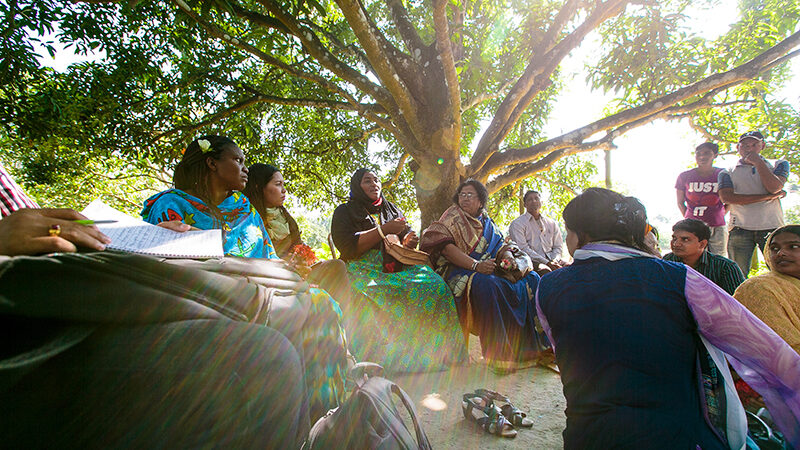A network of over 2000 justice defending organisations has come together to share ideas in how to respond to the global health crisis.
Covid-19 has brought the globe to a standstill as strict lockdown measures have been enforced to stop the spread of the deadly virus.
Governments are turning their attention towards battling the ongoing health crisis, while issues stemming from climate change are only being exacerbated.
But Covid-19 and the climate crisis both require community resilience and collective action. Societies have an opportunity to address them together through the implementation of new green packages and recovery policies.
Namati, an NGO that advances global justice through education and empowerment, has been quick to notice how the solutions to both Covid and climate complement each other and has taken a look at what it can learn from a collective crisis.
The NGO works to train and support community members to serve as paralegals (sometimes called “barefoot lawyers”) so that, with basic training in the law, they can help their neighbours understand and assert their legal rights. Whether the concern is food system resilience, fighting pollution, access to health care, or police violence, people need to know their rights and how the law works as a foundation for solving problems.
Namati also coordinates a global network of organisations supporting paralegals and their communities. As the pandemic has unfolded, this network has sprung powerfully into action.
More than 2200 organisations across 160 countries comprise Namati’s Legal Empowerment Network, which advocates for a just and fair world where citizens can use the law to exercise their rights.
“At the start of the pandemic, we realised that the first thing we needed to do was gather information from network member organisations,” said Abigail Moy, Director of the Legal Empowerment Network.
“What we heard, and what continues to be the case, is that the pandemic is deepening structural injustices. It is worsening issues that were already affecting the vulnerability of communities,” she added.
The digital divide, for example, has been particularly acute. Remote communities addressing climate change issues already struggle to access the means to communicate, and now these same communities suffer from even greater isolation due to the pandemic’s restrictions on movement.
For Moy, the need for justice was at an all-time high, so the Network pivoted its annual strategy to address acute and urgent issues that had emerged due to the pandemic.
In the first stage of the Network’s response, they provided partners with accurate information and practical advice in the form of a continuously updated live document.
The document counters both the intentional and accidental spread of misinformation appearing across the internet that has accompanied the pandemic and international lockdown measures.
The Network set out to help its member organisations navigate unprecedented governmental restrictions to protect democratic rights and wanted to prevent community exploitation through the wielding of authoritarian power.
In the second stage, it built on its advisory output by creating strong connections between its many members through an online forum, which allows users to post questions and discuss topics relating to the pandemic. The Network hired a pandemic expert to take part, so that participants get accurate responses to their questions.
Already, over 300 discussion posts have been published with the ten most actively engaged at over 800 views each.
The Network also published the Covid-19 Justice Challenge, which acted as a survey to see how members were adapting and the help still needed. Complimenting the survey were various conference calls between groups across the network.
The Network determined the biggest challenge was the capacity to work remotely. 49% of the organisations struggled because of a lack of equipment or poor access to the internet. But despite the difficult circumstances, 91% of network member organisations were still serving their communities.
“It’s interesting that despite differences in geographic locations, we all face similar problems,” said one member of the Ataneo Human Rights Center in the Philippines, adding, “it’s good to hear how colleagues from other countries have addressed some of these issues”.
The Kariobangi Paralegal Network in Kenya , for example, saw an increase in arrests leading to overcrowding in police holding cells, so they are providing legal education through the use of local radio stations to guide the community through the justice system.
“Through analysing our forum, survey, and calls, we noticed three key issues being raised across the organisations,” said Moy.
“The first issue dealt with governments whose responses to COVID-19 were stifling fundamental and democratic freedoms. The second issue sought to answer how tech can be better utilised to take grassroots work remote, or to communicate important information during the pandemic? Number three aimed to secure funding for legal empowerment work. We need to integrate the access to justice into COVID-response and post-COVID stimulus packages, because justice is essential to building back stronger and fairer systems,” she added.
With these issues in mind, the Network moved towards what could be considered the third stage of its Covid-19 response strategy: how to act on these key issues to support communities around the world.
The Network has recently published a policy brief, titled “Grassroots Justice in a Pandemic: Ensuring a Just Response and Recovery.” It provides guidance for policymakers, donors and multilateral institutions on how to protect grassroots justice defenders during and after the pandemic.
This accompanies the wealth of other advisory publications, articles, and emails that the Network have put out over the last few months – they’ve created more online resources since February than they usually would in an entire year. They’re also exploring new ways to help mobilise funds for grassroots member organisations in need of flexible, rapid-relief grants.
“Covid-19 is a collective crisis so it’s forced our members to come together in unification and really transformed the community,” said Moy.
This post was sponsored by the Climate Justice Resilience Fund. See our editorial guidelines for what this means.
